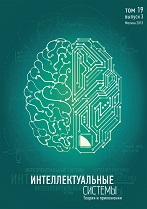|
|
Intelligent systems. Theory and applications, 2017, Volume 21, Issue 4, Pages 91–100
(Mi ista31)
|
 |
|
 |
One model of digital habits
A. P. Rijov, P. A. Novikov
Lomonosov Moscow State University, Faculty of Mechanics and Mathematics
Abstract:
The paper proposes the formalization of ways of using the information technologies on the basis of the analysis of smartphone's logs. The resulting model of human interaction with other people and information resources (digital world) can be used to personalize such a digital environment and accordingly, to optimize such interaction. A scenario for using the model to personalize the news feed is described.
Keywords:
personalization, digital footprint, fuzzy clustering.
Citation:
A. P. Rijov, P. A. Novikov, “One model of digital habits”, Intelligent systems. Theory and applications, 21:4 (2017), 91–100
Linking options:
https://www.mathnet.ru/eng/ista31 https://www.mathnet.ru/eng/ista/v21/i4/p91
|

| Statistics & downloads: |
| Abstract page: | 102 | | Full-text PDF : | 56 |
|




 Contact us:
Contact us: Terms of Use
Terms of Use
 Registration to the website
Registration to the website Logotypes
Logotypes








 Citation in format
Citation in format 